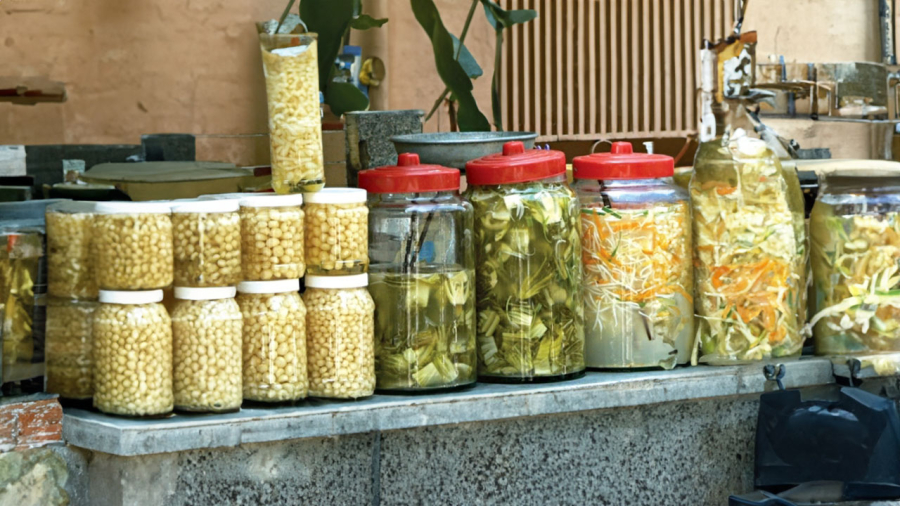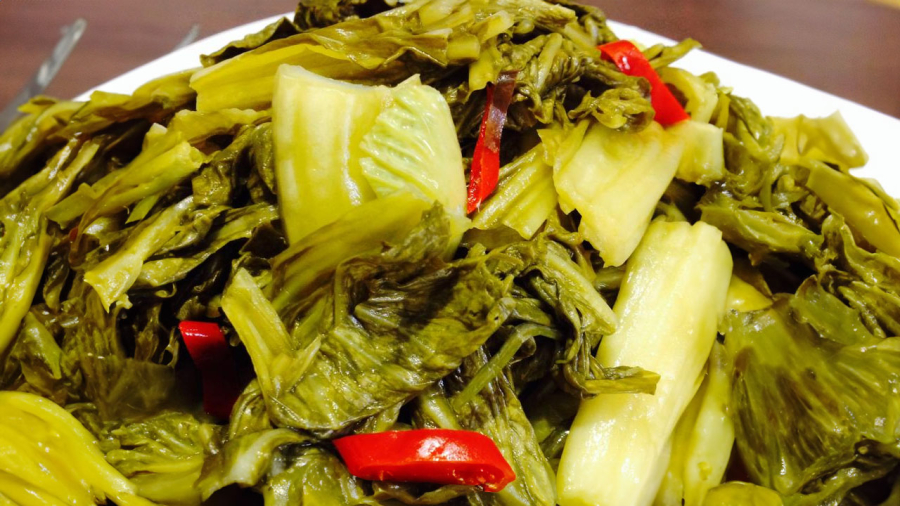Vietnam’s pickled salty dishes are very diverse, from pickled tomatoes, pickled lotus root, pickled radish, pickled onions, pickled cucumbers, pickled morning glory… These dishes are available year-round, in the summer they are eaten sour to relieve the heat, in the autumn they are eaten crisp with instant noodles for a delicious combination, in the winter they are eaten with grilled meat banana leaf cakes to avoid feeling greasy, and in the spring they are used to cook pickled vegetable soup to warm the stomach…
Pickled tomatoes are a fermentation process by microorganisms in a salt environment. Through the fermentation process, harmful microorganisms are suppressed, helping vegetables like cabbage and tomatoes preserve longer.
The fermentation process has transformed the nutritional composition of tomatoes and pickles, creating a fragrant and enticing flavor, reducing harmful indigestible substances such as solanine (in green tomatoes), and increasing beneficial microorganisms for the digestive system. However, eating them incorrectly can make pickled tomatoes toxic.

Mistakes that make pickled tomatoes toxic
Eating unfermented pickles: When tomatoes or vegetables are pickled before fully fermented, the toxins in the tomatoes and vegetables have not yet transformed, so they can still be harmful to the body, for example, the naturally occurring solanine in tomatoes. Furthermore, when they are not yet fermented and are still sour and spicy, the nitrate content in tomatoes and vegetables can turn into nitrite, increasing the risk of cancer.
Leaving pickles for too long and they become spoiled: When pickles are overly fermented, they become too sour, and at that point, they start to produce harmful bacteria for the digestive system.
Tomatoes and vegetables treated with agricultural chemicals during cultivation, or overdosed with nitrogen fertilizer: Buying tomatoes and vegetables that are not guaranteed to be safe and hygienic can result in the generation of more toxic substances when pickled, accumulating chemicals in the body.
Eating too salty: Pickled tomatoes usually require a high salt content. Therefore, if you eat too much, it will increase the amount of salt intake, leading to edema, water retention, obesity, kidney problems. Additionally, eating too much can cause indigestion.

The benefits of eating pickled tomatoes
Some studies on animals and epidemiology mainly conducted with kimchi have shown that this food has antioxidant and anti-cancer activities, antioxidant and anti-aging activities, antibacterial activities, and cholesterol reduction. Studies on pickled tomatoes are still limited.
Pickled cabbage has been found to increase the activity of detoxifying enzymes in the liver and kidneys. Some lactic acid bacteria in pickled cabbage produce conjugated linoleic acid, which has anti-cancer and anti-atherosclerotic effects. Pickled cabbage also contains antioxidants such as kaempferol (a flavonoid), isothiocyanates, indole-3-carbinol, which are beneficial for the body in terms of antimicrobial activity and preventing the growth of harmful bacteria.

How to eat pickled tomatoes for health benefits
Do not eat unfermented pickles, wait for them to ferment before consuming. In the first 3 days of pickling, when the tomatoes and vegetables are not yet sour, the nitrate content converts to nitrite rapidly due to nitrate-reducing bacteria. This level will gradually decrease until the tomatoes and vegetables are fully fermented, turn yellow, and change color.
Do not leave pickled tomatoes for too long until they become moldy because they often contain aspergilus flavor fungus, which produces aflatoxin, a factor that causes liver cancer.
People with kidney disease or high blood pressure should eat pickles in moderation. Even people without these conditions should consume them in moderation to avoid excessive salt intake. Pregnant women and young children should limit consumption of this food group.
Pickled tomatoes and vegetables should be stored in porcelain or glass containers, avoiding plastic containers that can be hazardous. Especially avoid using reused containers that were not specifically designed for food, such as paint cans or animal feed containers…





































